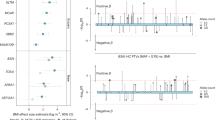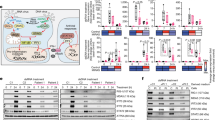Abstract
Crohn’s disease (CD) is a polygenic immune-mediated disease characterized by gastrointestinal inflammation. Mice deficient in the hematopoietic-restricted SH2 domain-containing inositolpolyphosphate 5′-phosphatase (SHIP) develop spontaneous CD-like ileal inflammation. Intriguingly, SHIP mRNA is not upregulated in biopsies from patients with ileal CD despite immune cell infiltration, but SHIP’s role in human CD remains unknown. We analyzed SHIP mRNA expression and activity in biopsies and peripheral blood mononuclear cells (PBMCs) from control and treatment-naive subjects with ileal CD, and demonstrated that SHIP mRNA and activity were lower in hematopoietic cells in ileal biopsies and PBMCs from subjects with CD. In all tissues from our patient cohort and in PBMCs from a second healthy control cohort, subjects homozygous for the autophagy-related 16-like protein (ATG16L1) CD-associated gene variant (rs2241880), had low SHIP mRNA expression and activity. SHIP protein expression increased during autophagy and SHIP upregulation was dependent on ATG16L1 and/or autophagy, as well as the ATG16L1 CD-associated gene variant. Finally, homozygosity for the ATG16L1 risk variant and low SHIP mRNA expression is inversely related to increased (LPS+ATP)-induced IL-1β production by PBMCs in our cohorts and was regulated by increased transcription of ILIB. These data suggest a novel mechanism by which the ATG16L1 CD-associated gene variant may predispose people to develop intestinal inflammation.
This is a preview of subscription content, access via your institution
Access options
Subscribe to this journal
Receive 6 digital issues and online access to articles
$119.00 per year
only $19.83 per issue
Buy this article
- Purchase on Springer Link
- Instant access to full article PDF
Prices may be subject to local taxes which are calculated during checkout







Similar content being viewed by others
References
Xavier RJ, Podolsky DK . Unravelling the pathogenesis of inflammatory bowel disease. Nature 2007; 448: 427–434.
Jostins L, Ripke S, Weersma RK, Duerr RH, McGovern DP, Hui KY et al. Host-microbe interactions have shaped the genetic architecture of inflammatory bowel disease. Nature 2012; 491: 119–124.
Maloy KJ, Powrie F . Intestinal homeostasis and its breakdown in inflammatory bowel disease. Nature 2011; 474: 298–306.
Hampe J, Franke A, Rosenstiel P, Till A, Teuber M, Huse K et al. A genome-wide association scan of nonsynonymous SNPs identifies a susceptibility variant for Crohn disease in ATG16L1. Nat Genet 2007; 39: 207–211.
Yang SK, Ye BD, Song K . ATG16L1 contributes to Crohn's disease susceptibility in Koreans: overmuch concern for ethnic difference? Gut 2015; 64: 687–688.
Zhang J, Chen J, Gu J, Guo H, Chen W . Association of IL23R and ATG16L1 with susceptibility of Crohn's disease in Chinese population. Scand J Gastroenterol 2014; 49: 1201–1206.
Hirano A, Yamazaki K, Umeno J, Ashikawa K, Aoki M, Matsumoto T et al. Association study of 71 European Crohn's disease susceptibility loci in a Japanese population. Inflamm Bowel Dis 2013; 19: 526–533.
Prescott NJ, Fisher SA, Franke A, Hampe J, Onnie CM, Soars D et al. A nonsynonymous SNP in ATG16L1 predisposes to ileal Crohn's disease and is independent of CARD15 and IBD5. Gastroenterology 2007; 132: 1665–1671.
International HapMap C, Altshuler DM, Gibbs RA, Peltonen L, Altshuler DM, Gibbs RA et al. Integrating common and rare genetic variation in diverse human populations. Nature 2010; 467: 52–58.
Okazaki T, Wang MH, Rawsthorne P, Sargent M, Datta LW, Shugart YY et al. Contributions of IBD5, IL23R, ATG16L1, and NOD2 to Crohn's disease risk in a population-based case-control study: evidence of gene-gene interactions. Inflamm Bowel Dis 2008; 14: 1528–1541.
Mizushima N, Levine B, Cuervo AM, Klionsky DJ . Autophagy fights disease through cellular self-digestion. Nature 2008; 451: 1069–1075.
Saitoh T, Fujita N, Jang MH, Uematsu S, Yang BG, Satoh T et al. Loss of the autophagy protein Atg16L1 enhances endotoxin-induced IL-1beta production. Nature 2008; 456: 264–268.
Cadwell K, Liu JY, Brown SL, Miyoshi H, Loh J, Lennerz JK et al. A key role for autophagy and the autophagy gene Atg16l1 in mouse and human intestinal Paneth cells. Nature 2008; 456: 259–263.
Cadwell K, Patel KK, Maloney NS, Liu TC, Ng AC, Storer CE et al. Virus-plus-susceptibility gene interaction determines Crohn's disease gene Atg16L1 phenotypes in intestine. Cell 2010; 141: 1135–1145.
Sadaghian Sadabad M, Regeling A, de Goffau MC, Blokzijl T, Weersma RK, Penders J et al. The ATG16L1-T300A allele impairs clearance of pathosymbionts in the inflamed ileal mucosa of Crohn's disease patients. Gut 2014, e-pub ahead of print 24 September 2014; doi:10.1136/gutjnl-2014-307289.
Murthy A, Li Y, Peng I, Reichelt M, Katakam AK, Noubade R et al. A Crohn's disease variant in Atg16l1 enhances its degradation by caspase 3. Nature 2014; 506: 456–462.
Lassen KG, Kuballa P, Conway KL, Patel KK, Becker CE, Peloquin JM et al. Atg16L1 T300A variant decreases selective autophagy resulting in altered cytokine signaling and decreased antibacterial defense. Proc Natl Acad Sci USA 2014; 111: 7741–7746.
Plantinga TS, Crisan TO, Oosting M, van de Veerdonk FL, de Jong DJ, Philpott DJ et al. Crohn's disease-associated ATG16L1 polymorphism modulates pro-inflammatory cytokine responses selectively upon activation of NOD2. Gut 2011; 60: 1229–1235.
Dinarello CA . A clinical perspective of IL-1beta as the gatekeeper of inflammation. Eur J Immunol 2011; 41: 1203–1217.
Henao-Mejia J, Elinav E, Strowig T, Flavell RA . Inflammasomes: far beyond inflammation. Nat Immunol 2012; 13: 321–324.
Strowig T, Henao-Mejia J, Elinav E, Flavell R . Inflammasomes in health and disease. Nature 2012; 481: 278–286.
Rathinam VA, Vanaja SK, Fitzgerald KA . Regulation of inflammasome signaling. Nat Immunol 2012; 13: 333–342.
Sly LM, Hamilton MJ, Kuroda E, Ho VW, Antignano FL, Omeis SL et al. SHIP prevents lipopolysaccharide from triggering an antiviral response in mice. Blood 2009; 113: 2945–2954.
Sly LM, Rauh MJ, Kalesnikoff J, Song CH, Krystal G . LPS-induced upregulation of SHIP is essential for endotoxin tolerance. Immunity 2004; 21: 227–239.
Weisser SB, Brugger HK, Voglmaier NS, McLarren KW, van Rooijen N, Sly LM . SHIP-deficient, alternatively activated macrophages protect mice during DSS-induced colitis. J Leukoc Biol 2011; 90: 483–492.
McLarren KW, Cole AE, Weisser SB, Voglmaier NS, Conlin VS, Jacobson K et al. SHIP-deficient mice develop spontaneous intestinal inflammation and arginase-dependent fibrosis. Am J Pathol 2011; 179: 180–188.
Kerr WG, Park MY, Maubert M, Engelman RW . SHIP deficiency causes Crohn's disease-like ileitis. Gut 2011; 60: 177–188.
Arijs I, De Hertogh G, Lemmens B, Van der Goten J, Vermeire S, Schuit F et al. Intestinal expression of SHIP in inflammatory bowel diseases. Gut 2012; 61: 956–957.
Viernes DR, Choi LB, Kerr WG, Chisholm JD . Discovery and development of small molecule SHIP phosphatase modulators. Med Res Rev 2014; 34: 795–824.
Van Limbergen J, Kabakchiev B, Stempak JM, Schumm P, Xu W, Henderson P et al. Hypothesis-free analysis of ATG16L1 demonstrates gene-wide extent of association with Crohn's disease susceptibility. Gut 2013; 62: 331–333.
Mowat AM, Agace WW . Regional specialization within the intestinal immune system. Nat Rev Immunol 2014; 14: 667–685.
Weisser SB, McLarren KW, Voglmaier N, van Netten-Thomas CJ, Antov A, Flavell RA et al. Alternative activation of macrophages by IL-4 requires SHIP degradation. Eur J Immunol 2011; 41: 1742–1753.
Fritz T, Niederreiter L, Adolph T, Blumberg RS, Kaser A . Crohn's disease: NOD2, autophagy and ER stress converge. Gut 2011; 60: 1580–1588.
O Farrell F, Rusten TE, Stenmark H . Phosphoinositide 3-kinases as accelerators and brakes of autophagy. FEBS J 2013; 280: 6322–6337.
Begun J, Xavier RJ . Autophagy at the crossroads of metabolism and cellular defense. Curr Opin Gastroenterol 2013; 29: 588–596.
Dharmani P, Chadee K . Biologic therapies against inflammatory bowel disease: a dysregulated immune system and the cross talk with gastrointestinal mucosa hold the key. Curr Mol Pharmacol 2008; 1: 195–212.
Tosato G, Jones KD . Interleukin-1 induces interleukin-6 production in peripheral blood monocytes. Blood 1990; 75: 1305–1310.
Zhang YH, Lin JX, Vilcek J . Interleukin-6 induction by tumor necrosis factor and interleukin-1 in human fibroblasts involves activation of a nuclear factor binding to a kappa B-like sequence. Mol Cell Biol 1990; 10: 3818–3823.
Campbell J, Ciesielski CJ, Hunt AE, Horwood NJ, Beech JT, Hayes LA et al. A novel mechanism for TNF-alpha regulation by p38 MAPK: involvement of NF-kappa B with implications for therapy in rheumatoid arthritis. J Immunol 2004; 173: 6928–6937.
Hsu HY, Wen MH . Lipopolysaccharide-mediated reactive oxygen species and signal transduction in the regulation of interleukin-1 gene expression. J Biol Chem 2002; 277: 22131–22139.
Ligumsky M, Simon PL, Karmeli F, Rachmilewitz D . Role of interleukin 1 in inflammatory bowel disease—enhanced production during active disease. Gut 1990; 31: 686–689.
Reinecker HC, Steffen M, Witthoeft T, Pflueger I, Schreiber S, MacDermott RP et al. Enhanced secretion of tumour necrosis factor-alpha, IL-6, and IL-1 beta by isolated lamina propria mononuclear cells from patients with ulcerative colitis and Crohn's disease. Clin Exp Immunol 1993; 94: 174–181.
Casini-Raggi V, Kam L, Chong YJ, Fiocchi C, Pizarro TT, Cominelli F . Mucosal imbalance of IL-1 and IL-1 receptor antagonist in inflammatory bowel disease. A novel mechanism of chronic intestinal inflammation. J Immunol 1995; 154: 2434–2440.
McAlindon ME, Hawkey CJ, Mahida YR . Expression of interleukin 1 beta and interleukin 1 beta converting enzyme by intestinal macrophages in health and inflammatory bowel disease. Gut 1998; 42: 214–219.
Avitzur Y, Guo C, Mastropaolo LA, Bahrami E, Chen H, Zhao Z et al. Mutations in tetratricopeptide repeat domain 7A result in a severe form of very early onset inflammatory bowel disease. Gastroenterology 2014; 146: 1028–1039.
Latz E, Xiao TS, Stutz A . Activation and regulation of the inflammasomes. Nat Rev Immunol 2013; 13: 397–411.
Nakahira K, Haspel JA, Rathinam VA, Lee SJ, Dolinay T, Lam HC et al. Autophagy proteins regulate innate immune responses by inhibiting the release of mitochondrial DNA mediated by the NALP3 inflammasome. Nat Immunol 2011; 12: 222–230.
Shi CS, Shenderov K, Huang NN, Kabat J, Abu-Asab M, Fitzgerald KA et al. Activation of autophagy by inflammatory signals limits IL-1beta production by targeting ubiquitinated inflammasomes for destruction. Nat Immunol 2012; 13: 255–263.
Harris J, Hartman M, Roche C, Zeng SG, O'Shea A, Sharp FA et al. Autophagy controls IL-1beta secretion by targeting pro-IL-1beta for degradation. J Biol Chem 2011; 286: 9587–9597.
Jones SA, Mills KH, Harris J . Autophagy and inflammatory diseases. Immunol Cell Biol 2013; 91: 250–258.
Harris J, Hartman M, Roche C, Zeng SG, O'Shea A, Sharp FA et al. Autophagy controls IL-1beta secretion by targeting pro-IL-1beta for degradation. J Biol Chem 2011; 286: 9587–9597.
Weisser SB, Brugger HK, Voglmaier NS, McLarren KW, van Rooijen N, Sly LM . SHIP-deficient, alternatively activated macrophages protect mice during DSS-induced colitis. J Leukoc Biol; 90: 483–492.
Acknowledgements
We would like to thank members of the Divisions of Anesthesiology and Gastroenterology at BC Children’s Hospital for support with acquiring blood and biopsy samples. We are grateful for salary support for ENN and MM from the Transplantation Training Program at the University of British Columbia, which is funded by Canadian Institutes of Health Research (CIHR); for ENN from the Child & Family Research Institute studentship and the MITACs Accelerate fellowship programs; and LMS from the Canadian Association of Gastroenterology/Crohn’s and Colitis Canada/CIHR New Investigator Salary Award and the Michael Smith Foundation for Health Research Scholar Award. This work was funded by a grant from the CIHR (MOP-133607) to LMS.
Author information
Authors and Affiliations
Corresponding author
Ethics declarations
Competing interests
The authors declare no conflict of interest.
Rights and permissions
About this article
Cite this article
Ngoh, E., Brugger, H., Monajemi, M. et al. The Crohn’s disease-associated polymorphism in ATG16L1 (rs2241880) reduces SHIP gene expression and activity in human subjects. Genes Immun 16, 452–461 (2015). https://doi.org/10.1038/gene.2015.30
Received:
Revised:
Accepted:
Published:
Issue Date:
DOI: https://doi.org/10.1038/gene.2015.30
This article is cited by
-
Colonic microbiota is associated with inflammation and host epigenomic alterations in inflammatory bowel disease
Nature Communications (2020)
-
Phosphatidylinositol 3-kinase p110δ drives intestinal fibrosis in SHIP deficiency
Mucosal Immunology (2019)



